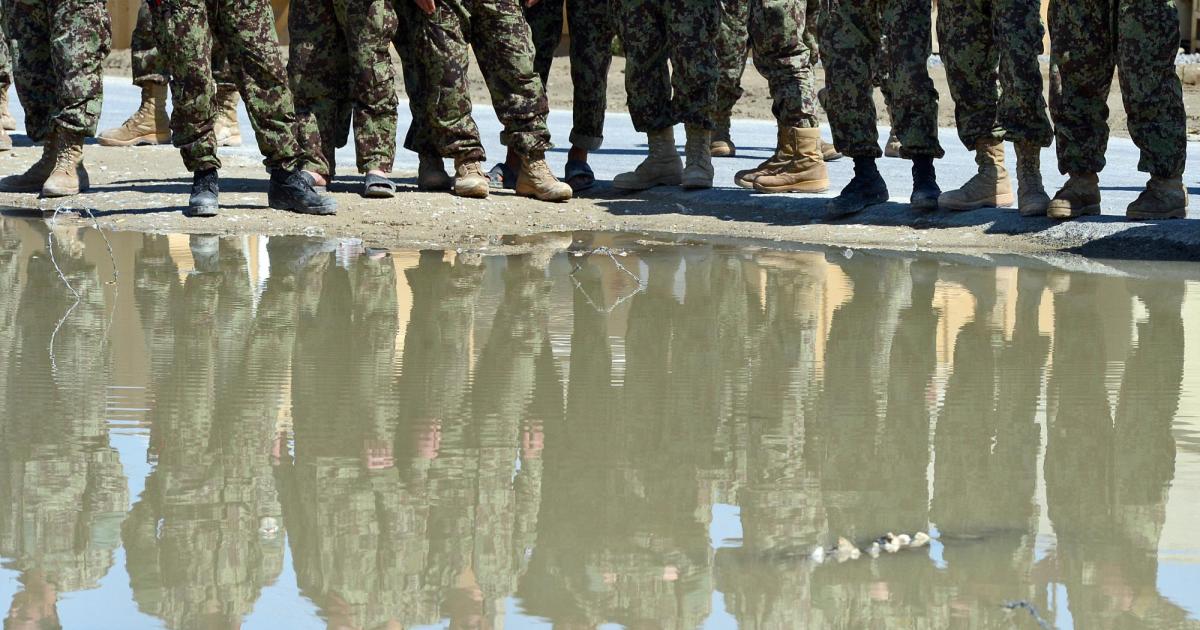Afghan Soldiers in Ukraine: Seeking Revenge on Americans
Keskeiset käsitteet
The author highlights how former Afghan soldiers, abandoned by the US and hunted by the Taliban, are recruited to fight for Russia in Ukraine as a form of revenge. The core argument revolves around the exploitation of these soldiers' skills and frustrations by Russian actors for their own military agenda.
Tiivistelmä
Former Afghan soldiers, left behind by the collapse of their country's government, are being lured to fight in Ukraine against the Americans who abandoned them. Recruited by Russian entities like the Wagner Group, these ex-soldiers face a choice between fighting for Russia or returning to Afghanistan, highlighting their desperation and manipulation for profit.
Mukauta tiivistelmää
Kirjoita tekoälyn avulla
Luo viitteet
Käännä lähde
toiselle kielelle
Luo miellekartta
lähdeaineistosta
Siirry lähteeseen
www.profil.at
Afghanische Soldaten in der Ukraine: "Wir wollen uns rächen"
Tilastot
Die USA hatten fast 90 Milliarden Dollar in den Aufbau der afghanischen Verteidigungs- und Sicherheitskräfte investiert.
Der versprochene Sold: 3000 US-Dollar pro Monat.
Die paramilitärische Kampftruppe Wagner ist eng mit dem russischen Verteidigungsministerium und dem Geheimdienst GRU verstrickt.
Mehrere Dutzend afghanische Kämpfer sollen den Iran bereits in Richtung Russland verlassen haben.
Das Magazin „Foreign Policy“ spricht gar von 10.000 ehemaligen afghanischen Soldaten, die bald aufseiten Russlands in der Ukraine kämpfen könnten.
Lainaukset
"Lasst uns in die Ukraine ziehen! Dort können wir uns an den Amerikanern, die uns verraten haben, rächen!" - Samim
"Viele wollen nun für Russland kämpfen. Gegen die Ukraine. Sie fühlen sich von den USA seit dem Abzug verraten und wollen es ihnen auf diese Weise heimzahlen." - Mustafa
Tärkeimmät oivallukset
by Emran Feroz klo www.profil.at 02-08-2023
https://www.profil.at/ausland/afghanische-soldaten-in-der-ukraine-wir-wollen-uns-raechen/402316160
Syvällisempiä Kysymyksiä
How does the recruitment of Afghan soldiers by Russian forces impact the ongoing conflict in Ukraine?
The recruitment of Afghan soldiers by Russian forces has significant implications for the ongoing conflict in Ukraine. Firstly, it adds a new dimension to the conflict by introducing experienced fighters who have been trained in counterinsurgency tactics and warfare. These Afghan soldiers bring a level of expertise and combat skills that could potentially shift the balance on the battlefield. Additionally, their presence may escalate tensions between Russia and Western powers, as it demonstrates Moscow's willingness to engage in unconventional methods to achieve its military objectives.
What ethical considerations should be taken into account when recruiting vulnerable individuals for military purposes?
When recruiting vulnerable individuals for military purposes, several ethical considerations must be taken into account. Firstly, there should be transparency regarding the nature of their involvement and potential risks they may face. Informed consent is crucial to ensure that these individuals understand what they are signing up for. Moreover, efforts should be made to safeguard their well-being during and after their service, including access to mental health support and reintegration programs post-conflict.
How can international intervention prevent the exploitation of disenfranchised ex-soldiers for foreign agendas?
International intervention can play a crucial role in preventing the exploitation of disenfranchised ex-soldiers for foreign agendas. One key approach is through diplomatic pressure on countries engaging in such practices, highlighting human rights violations and breaches of international law associated with recruiting vulnerable populations for military purposes. Providing economic assistance and development opportunities in regions where ex-soldiers are at risk can also reduce their susceptibility to recruitment by foreign actors. Furthermore, establishing mechanisms for monitoring and reporting on such activities can increase accountability and deter future exploitation.
0
